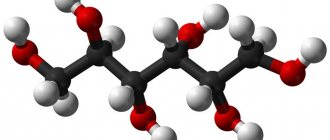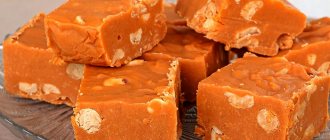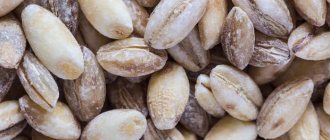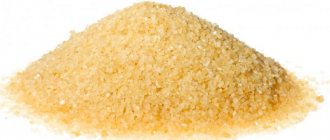Harm and side effects of creatine[edit | edit code]
One of the most frequently raised questions is the side effects of creatine and what harm it can cause to an athlete’s health. Experience shows that the incidence of side effects with creatine is quite low (less than 4%), and there is practically no irreversible harm to health[1]. Several studies have confirmed that creatine is a safe dietary supplement [2], and in one experiment on mice, creatine was found to improve the quality and length of life [3], in addition, the safety of creatine can be confirmed by the fact that some studies used very large doses (25 g per day) for a long time, while the subjects did not experience any health problems.[4] However, side effects of creatine sometimes occur.
Some side effects are associated not only with creatine, but also with the components with which it is often combined, for example, simple sugars, vasoactive amino acids, etc. This article describes the side effects of creatine that are directly related to it and do not depend on third-party factors. Due to the fact that the mechanism of action and biological activity of creatine are not yet fully understood, many side effects do not have clear explanations.
What is it and why do athletes take it?
Creatine is a nitrogen-containing carboxylic acid that is produced in the body of all vertebrates. The compound is synthesized on the basis of amino acids and can accumulate in body tissues. Also, the body can get a large proportion of the substance from simple foods - red meat, seeds, nuts, etc. However, during high physical activity, compounds from food are not enough, which leads to additional intake of sports supplements.
Note! The most inexpensive and effective form is creatine monohydrate (for example, a popular option on IHERB is Optimum Nutrition, Micronized Creatine Powder).
Optimum Nutrition, Creatine Fine Powder, Unflavored, 1.32 lbs (600 g)
Price – ₽1,737.01
Buy from a partner
The supplement provides the athlete’s body with the necessary energy during intense sports activities. The pronounced effect appears gradually if the dosage is observed and the product is taken regularly. Athletes also use creatine to neutralize acids in the muscles. This reduces overall fatigue during the training process, allowing you to increase strength and overall performance.
Be sure to check out:
Creatine: properties of the supplement and its importance in sports nutrition. Expiration date and storage of creatine. Is it possible to mix BCAA with creatine and what can this lead to? Creatine and protein: rules for taking it together
Water retention[edit | edit code]
The strongest justification is for side effects that are associated with the osmotic activity of creatine; simply put, creatine consumption is associated with an increase in water retention in the body. This phenomenon occurs in almost everyone who consumes creatine, while water retention does not harm the body, and occurs as a compensatory reaction to balance the osmotic imbalance. Water retention itself is practically unnoticeable, and it can only be determined by scales; no edema or “swelling” of the face occurs in healthy people. Typically, the increase in the percentage of liquid is insignificant; on average, its volume is 0.5 - 2 liters, which cannot be determined externally or subjectively.
Do not try to limit fluid intake, and especially do not take diuretics to prevent fluid retention. By reducing the manifestations of this harmless phenomenon, you can harm the body due to dehydration.
As a rule, after stopping creatine, weight loss occurs (20 - 30% of the gain), this is associated with the removal of accumulated fluid.
Benefits of CREATINE
Despite the existence of various myths, this supplement is completely harmless and has been clinically tested. Moreover, the substance is often used by neurologists to treat patients.
Taking supplements increases creatine phosphate stores. It is a form of stored energy in cells because it helps the body produce higher energy molecules called ATP.
- Accelerating muscle growth
- Increased strength and endurance
- Body definition and fat reduction
- Rapid muscle recovery after stress (by reducing the secretion of lactic acid)
- Reduces blood cholesterol levels
Dehydration[edit | edit code]
Dehydration is directly related to the previous effect. The osmotic activity of creatine leads to the transfer of the liquid part of the blood into the muscles, thus, to some extent, the body is dehydrated, while metabolism, heat regulation, acid-base balance, etc. are disrupted. This dictates the need to consume a sufficient amount of fluid in a volume of up to 3 liters per day . Adequate rehydration allows you to normalize the electrolyte balance of the internal environment of the body, as well as prevent some other side effects of creatine.
This problem is especially relevant in bodybuilding, since many athletes, taking creatine, begin so-called drying with the help of diuretics and stimulants that remove fluid from the body, in which case significant harm can be caused to the body.
Digestive disorders[edit | edit code]
The second most common side effect of creatine is gastrointestinal distress, which is manifested by abdominal pain, nausea, flatulence and diarrhea. Digestive problems are especially common during the loading phase when large doses of creatine are used. Gastrointestinal distress occurs as a result of the presence of slowly dissolving creatine crystals in the stomach in a fairly large volume. Often, digestive problems are associated with poor purification of creatine, so preference should be given to quality supplements. To prevent this side effect, micronized, encapsulated and liquid forms of creatine have been created, although the latter are not recommended due to low efficiency.
New chemical forms of creatine (Ethyl ester, crealkaline, and others) have the same side effects on the intestines as monohydrate, contrary to advertising slogans. Quite often, manufacturers use a trick and advise using new forms in small doses. Of course, this reduces the frequency of side effects, but at the same time the effectiveness decreases. Studies have shown that the doses of the new forms to obtain the desired effect should be the same as the monohydrate.
There is evidence that creatine citrate and creatine malate cause fewer side effects on the gastrointestinal tract due to good solubility.
Cramps and spasms[edit | edit code]
These side effects are often heard on forums and in the press. In practice, seizures occur very rarely. Some scientists generally deny the connection between cramps and spasms with creatine, since tests on athletes do not reveal a clear pattern.[5] Muscle cramps can occur as a result of electrolyte disturbances and dehydration while taking creatine; as a preventive measure, you should consume sufficient fluids. In addition, the role of an increase in strength indicators is assumed, in other words, cramps can occur due to an increase in muscle strength, so during training they are subject to greater load, and at the time of rest, as a recovery reaction, spasms occur.
How to take creatine
For gaining muscle mass
Back in 1985, the Journal of Applied Physiology published an article evaluating different dosages when taking creatine. As a result of analyzing the results obtained, the following method of using a dietary supplement to gain muscle mass was proposed (this method is still used today):
- Loading phase: 4 times a day, 5 grams for 6 days. Allows you to increase creatine reserves in the body by 20%.
- Maintenance phase: in the future, to maintain the achieved level of reserves, it is enough to take 2-3 grams per day. More recent studies have shown that this dosage can be increased to 3-5 grams.
As an alternative, a formula for calculating dosage based on the athlete's weight was proposed:
0.3 grams of creatine per 1 kg of body weight per day, divided into 4 equal servings
The study also found that taking a lower dose (3 grams per day) for 28 days increased total muscle creatine storage by the same 20% as fast loading for 6 days. However, the 28-day phase does not allow the ergogenic (performance-enhancing) benefits of creatine to be realized until the muscle tissue is fully saturated. That is, you will be able to fully train according to the chosen program only when the required level of reserves is reached at the end of the month.
Another study found that supplementing with carbohydrates or carbohydrates and protein along with creatine helped maintain tissue stores longer.
After discontinuation of creatine supplementation, muscle stores return to baseline levels within 4–6 weeks. The achieved strength and volume indicators (except for excess water in the tissues) are maintained.
For drying
Due to the fact that taking creatine leads to the accumulation of excess water in the muscles and an increase in body weight, it is not advisable to take it during the cutting phase. Also during this period it is worth limiting the intake of fast carbohydrates for the same reason.
When exercising to develop endurance
In endurance sports, creatine will not provide any benefits, moreover, increasing body weight will negatively affect the athlete's economy. The only type of cycling discipline (running, cycling, swimming) for which creatine supplementation would be appropriate is sprinting, since it uses short intervals of high-intensity exercise.
Non-existent side effects and harm[edit | edit code]
Currently, you can find a lot of misinformation regarding the side effects of creatine. To resolve doubts, here is a list of non-existent side effects and harms of creatine:
- Creatine does not increase blood pressure[8][9][10]
- Creatine does not reduce potency and does not lead to infertility
- Creatine is not carcinogenic
- Creatine does not overload the heart[11]
- Creatine is not addictive
And finally, it should be noted that after completing the course, the gained muscle mass is retained by 70-80%. Some weight loss (20-30%) occurs due to the removal of excess fluid.
The only desirable side effect
A positive side effect of creatine is an increase in muscle mass from 0.9 to 1.7 kg. There are two assumptions why this effect is observed:
- the substance retains fluid in the muscles;
- muscle mass itself grows.
Scientists do not agree on this either. Some believe that the side effect is due to two factors.
Links[edit | edit code]
- Groeneveld, G. J., Beijer, C., Veldink, J. H., Kalmijn, S., Wokke, J. H. J., & van den Berg, L. H. (2004). Few adverse effects of long-term creatine supplementation in a placebo-controlled trial. International Journal of Sports Medicine, 25
- Mayhew DL, Mayhew JL, Ware JS (2002). "Effects of long-term creatine supplementation on liver and kidney functions in American college football players." Int J Sport Nutr Exerc Metab. 12(4):453–60
- Bender A, Beckers J, Schneider I, et al. (September 2008). "Creatine improves health and survival of mice." Neurobiol. Aging 29(9):1404–11.
- Mayhew, D. L., Mayhew, J. L., & Ware, J. S. (2002). Effects of long-term creatine supplementation on liver and kidney functions in American college football players. International Journal of Sport Nutrition and Exercise Metabolism, 12, 453-460
- Kreider R, Rasmussen C, Ransom J, Almada AL. (1998). "Effects of creatine supplementation during training on the incidence of muscle cramping, injuries and GI distress." Journal of Strength Conditioning Research 12 (275).
- Kreider, R. B., Melton, C., Rasmussen, C. J., Greenwood, M., Lancaster, S., Cantler, E. C., Milnor, P., & Almada, A. L. (2003). Long-term creatine supplementation does not significantly affect clinical markers of health in athletes. Molecular and Cellular Biochemistry, 244, 95-104
- Kreider, R. B.; Melton, C., Rasmussen, C. J., Greenwood, M., Lancaster, S., Cantler, E. C., Milnor, P. & Almada, A. L. (2004-11-01). “Long-term creatine supplementation does not significantly affect clinical markers of health in athletes”
- Armentano MJ, Brenner AK, The effect and safety of short-term creatine supplementation on the performance of push-ups. Mil Med. 2007 Mar;172(3):312-7.
- Vannas-Sulonen, K., Sipila, I., Vannas, A., Simell, O., & Rapola, J. A five year follow-up of creatine supplementation
- Acute and chronic safety and efficacy of dose dependent creatine nitrate supplementation and exercise performance. Elfego Galvan, Dillon K. Walker, Sunday Y. Simbo, Ryan Dalton, Kyle Levers, Abigail O'Connor, Chelsea Goodenough, Nicholas D. Barringer, Mike Greenwood, Christopher Rasmussen, Stephen B. Smith, Steven E. Riechman, James D Fluckey, Peter S. Murano, Conrad P. Earnest and Richard B. KreiderEmail. Journal of the International Society of Sports Nutrition201613:12 DOI: 10.1186/s12970-016-0124-0© Galvan et al. 2021 Scientific article web address: https://jissn.biomedcentral.com/articles/10.1186/s12970-016-0124-0
- Murphy AJ, Watsford ML, Effects of creatine supplementation on aerobic power and cardiovascular structure and function. J Sci Med Sport. 2005 Sep;8(3):305-13.
How it affects the body
Digestive system
Some gastrointestinal side effects may occur. Quite rarely, nausea, pain in the abdominal area and problems with bowel movements are observed.
Such phenomena occur due to insufficient dissolution of creatine crystals - this means that the product has not undergone the recommended purification and is of low quality. The use of a high-quality supplement, according to the manufacturer’s recommendations, minimizes such effects on the gastrointestinal tract.
New forms of creatine - citrate and malate - have maximum solubility and are suitable for people with sensitive stomachs.
Heart and blood vessels
Continuous use of creatine supplements in isolated cases leads to heart rhythm disturbances in male athletes (at increased dosages of the substance). However, this phenomenon has not been sufficiently studied, so it cannot be stated that creatine has a direct negative effect on the heart and vascular system.
Important! At the same time, the substance has a proven benefit - it increases ATP synthesis for stable functioning of the heart muscle under high loads.
Liver and kidneys
Studies have shown (Bender A, Beckers J, Schneider I, et al.) that regular supplementation of creatine for up to 2 years does not affect kidney function. Such data relate to healthy athletes who have not previously had pathologies of the excretory system. If you have chronic diseases in this area, you should consult a doctor. Otherwise, creatine may place increased stress on the kidneys due to moisture accumulation.
The substance is not metabolized in the liver and is a natural component that is produced in the body.
From a biological point of view, creatine is not capable of causing toxic effects on liver cells. This thesis has been confirmed by practical research (Mayhew, DL, Mayhew, JL, & Ware, JS).
Water retention
The sports supplement provokes water retention in the tissues, but this does not cause significant harm to the athlete’s body. With healthy kidney function, there is no swelling or other negative manifestations. This phenomenon can only be noticed with regular weighing. During the break after a course of creatine, excess fluid will be eliminated naturally.
Effect on potency
The myth about the effect of creatine on potency is quite widespread among male athletes. This misconception was formed on the basis of analogies with hormonal supplements that directly regulate the level of sexual desire and capabilities of the male body.
Creatine does not have any side effects on potency. Even with regular and long-term use of a sports product in large dosages (for example, a “loading” plan), the athlete completely retains the natural level of hormones.
Note! This information concerns exclusively high-quality and original products that have been manufactured to high standards. Counterfeit and cheap drugs may contain dangerous preservatives, dyes and other additional ingredients that can affect potency and reproductive functions.
Muscletech, Essential Series, Platinum 100%, Creatine, Unflavored, 14.11 oz (400 g)
Price – ₽872.30
Buy from a partner
Now Foods, Sports, Creatine Monohydrate, 750 mg, 120 Vegetarian Capsules
Price – ₽630.14
Buy from a partner
Now Foods, Sports, Creatine Monohydrate, 1 kg (2.2 lb)
Price – RUB 1,487.55
Buy from a partner











